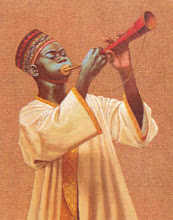

Almost alone among contemporary South African musicians, her songs tell us of the struggle for existence, the destruction of traditional culture and the need to 're-invent' tradition in the context of the new situation. In "Urban Zulu", Busi has succeeded in melding traditional Zulu music into a new one that informs us both of its roots and of the concerns of contemporary South African women. Based on a traditional Zulu musical form, Maskando, "Urban Zulu" is revolutionary on two levels, firstly it's being sung by a woman and secondly, it extends the traditional into the contemporary without losing anything of its roots.
Fighting with cancer for a long time,now she is better again and is touring. I only can hope that she will produce a new album soon
Tracks:
01: Yehlisan'Umoya Ma-Afrika [Afrikan Nation, Calm] (Mhlongo/Ngcobo/Ngwazi)
02: Yapheli'Maliyami [My Money is Gone] Mhlongo/Ngcob/Ngwazi)
03: We Baba Omncane [If You Don't Obey Your Parents] (Mhlongo/Ngcobo/Ngwazi)
04: Ukuthula [Live in Peace] (Mhlonog/Ngcobo/Ngwazi)
05: Yise Wabant'A Bami [Father of My Children] (Mhlongo/Kanza)
06: Uganga Nge Ngane [You're playing around with this child] (Mhlonog/Ngcobo/Ngwazi)
07: Ngadlalwa Yindoda [He's toying with me] (Mhlongo/Ngcobo/Ngwazi)
08: Nguye Lo [He's the one] Mhlongo/Ngcobo/Ngwazi)
09: Zithin'Izizwe [What are people saying about us?] Mhlongo/Ngcobo/Ngwazi)
10: Awukho Umuzi Ongena Kukhuluma Kwawo [There are problems in every home] (Mhlongo/Ngcobo/Ngwazi/Edwards)
11: Oxamu [The Crocodile] (Traditional)
Musicians:
Acoustic Guitar - Mkhalelwa "Spector" Ngwazi
Bass/bass concepts - Themba "Ntshebe" Ngcobo
Acoustic 12-string Guitar - Umfazi Omnyama
Concertina - Mphendukelwa Mkhize
Drums & drum concepts - Brice Wassy
Keyboards & programming - Will mowat
Percussion - Sydney Thiam
Backing Vocals - Thobi Mghobozi, Phika Mnyandu, Jabulani Mthembu, Mzonjani Shezi, Mkhalelwa Ngwazi, Themba Ngcobo
Backing Vocals - Siphiwe Kumalso, Xolisa Gqoli, Swazi Dlamini, Celiwe Mhlongo, Linda Gcwensa, Siphiwe Khanyile (Track 10)
Electric Guitars - Jack Djeyim (Tracks 1, 6, 7, 8, 9, 10)
Kora - Moussa Kanouté (Tracks 1, 2, 4)
Bongos - Mabi Thobejane (Track 4)
Marimba - Simpewe Motole (Tracks 1, 2, 7, 8, 9)
Voice - Mabi Thobejane (Track 1)
Bass - Hilaire Penda (Tracks 2, 4, 7, 8, 9, 10)
Bass - Noel Ekwabi (Track 3)
Acoustic Guitars, lead & backing vocals - Lokua Kanza (Track 10)
link ; part 1 http://www.megaupload.com/?d=PL06RYLI
part 2 http://www.megaupload.com/?d=Y9TA97JS

